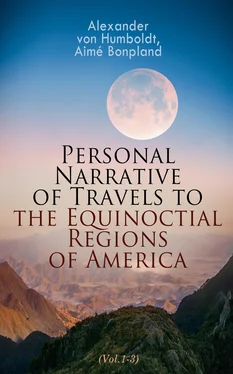Alexander von Humboldt, Aimé Bonpland
Personal Narrative of Travels to the Equinoctial Regions of America
(Vol.1-3)
Expedition in Central & South America 1799-1804
Translator: Thomasina Ross
e-artnow, 2021
Contact: info@e-artnow.org
EAN 4064066498481
Volume 1
Volume 2
Volume 3
Table of Contents
INTRODUCTION BY THE AUTHOR.
CHAPTER 1.1. PREPARATIONS. INSTRUMENTS. DEPARTURE FROM SPAIN. LANDING AT THE CANARY ISLANDS.
CHAPTER 1.2. STAY AT TENERIFE. JOURNEY FROM SANTA CRUZ TO OROTAVA. EXCURSION TO THE SUMMIT OF THE PEAK OF TEYDE.
CHAPTER 1.3. PASSAGE FROM TENERIFE TO SOUTH AMERICA. THE ISLAND OF TOBAGO. ARRIVAL AT CUMANA.
CHAPTER 1.4. FIRST ABODE AT CUMANA. BANKS OF THE MANZANARES.
CHAPTER 1.5. PENINSULA OF ARAYA. SALT-MARSHES. RUINS OF THE CASTLE OF SANTIAGO.
CHAPTER 1.6. MOUNTAINS OF NEW ANDALUCIA. VALLEY OF THE CUMANACOA. SUMMIT OF THE COCOLLAR. MISSIONS OF THE CHAYMA INDIANS.
CHAPTER 1.7. CONVENT OF CARIPE. CAVERN OF THE GUACHARO. NOCTURNAL BIRDS.
CHAPTER 1.8. DEPARTURE FROM CARIPE. MOUNTAIN AND FOREST OF SANTA MARIA. MISSION OF CATUARO. PORT OF CARIACO.
CHAPTER 1.9. PHYSICAL CONSTITUTION AND MANNERS OF THE CHAYMAS. THEIR LANGUAGE. FILIATION OF THE NATIONS WHICH INHABIT NEW ANDALUCIA. PARIAGOTOS SEEN BY COLUMBUS.
CHAPTER 1.10. SECOND ABODE AT CUMANA. EARTHQUAKES. EXTRAORDINARY METEORS.
CHAPTER 1.11. PASSAGE FROM CUMANA TO LA GUAYRA. MORRO OF NUEVA BARCELONA. CAPE CODERA. ROAD FROM LA GUAYRA TO CARACAS.
CHAPTER 1.12. GENERAL VIEW OF THE PROVINCES OF VENEZUELA. DIVERSITY OF THEIR INTERESTS. CITY AND VALLEY OF CARACAS. CLIMATE.
CHAPTER 1.13. ABODE AT CARACAS. MOUNTAINS IN THE VICINITY OF THE TOWN. EXCURSION TO THE SUMMIT OF THE SILLA. INDICATIONS OF MINES.
CHAPTER 1.14. EARTHQUAKES AT CARACAS. CONNECTION OF THOSE PHENOMENA WITH THE VOLCANIC ERUPTIONS OF THE WEST INDIA ISLANDS.
CHAPTER 1.15. DEPARTURE FROM CARACAS. MOUNTAINS OF SAN PEDRO AND OF LOS TEQUES. LA VICTORIA. VALLEYS OF ARAGUA.
INTRODUCTION BY THE AUTHOR.
Table of Contents
Many years have elapsed since I quitted Europe, to explore the interior of the New Continent. Devoted from my earliest youth to the study of nature, feeling with enthusiasm the wild beauties of a country guarded by mountains and shaded by ancient forests, I experienced in my travels, enjoyments which have amply compensated for the privations inseparable from a laborious and often agitated life. These enjoyments, which I endeavoured to impart to my readers in my 'Remarks upon the Steppes,' and in the 'Essay on the Physiognomy of Plants,' were not the only fruits I reaped from an undertaking formed with the design of contributing to the progress of natural philosophy. I had long prepared myself for the observations which were the principal object of my journey to the torrid zone. I was provided with instruments of easy and convenient use, constructed by the ablest makers, and I enjoyed the special protection of a government which, far from presenting obstacles to my investigations, constantly honoured me with every mark of regard and confidence. I was aided by a courageous and enlightened friend, and it was singularly propitious to the success of our participated labour, that the zeal and equanimity of that friend never failed, amidst the fatigues and dangers to which we were sometimes exposed.
Under these favourable circumstances, traversing regions which for ages have remained almost unknown to most of the nations of Europe, I might add even to Spain, M. Bonpland and myself collected a considerable number of materials, the publication of which may throw some light on the history of nations, and advance the study of nature.
I had in view a two-fold purpose in the travels of which I now publish the historical narrative. I wished to make known the countries I had visited; and to collect such facts as are fitted to elucidate a science of which we as yet possess scarcely the outline, and which has been vaguely denominated Natural History of the World, Theory of the Earth, or Physical Geography. The last of these two objects seemed to me the most important. I was passionately devoted to botany and certain parts of zoology, and I flattered myself that our investigations might add some new species to those already known, both in the animal and vegetable kingdoms; but preferring the connection of facts which have been long observed, to the knowledge of insulated facts, although new, the discovery of an unknown genus seemed to me far less interesting than an observation on the geographical relations of the vegetable world, on the migrations of the social plants, and the limit of the height which their different tribes attain on the flanks of the Cordilleras.
The natural sciences are connected by the same ties which link together all the phenomena of nature. The classification of the species, which must be considered as the fundamental part of botany, and the study of which is rendered attractive and easy by the introduction of natural methods, is to the geography of plants what descriptive mineralogy is to the indication of the rocks constituting the exterior crust of the globe. To comprehend the laws observed in the position of these rocks, to determine the age of their successive formations, and their identity in the most distant regions, the geologist should be previously acquainted with the simple fossils which compose the mass of mountains, and of which the names and character are the object of oryctognostical knowledge. It is the same with that part of the natural history of the globe which treats of the relations plants have to each other, to the soil whence they spring, or to the air which they inhale and modify. The progress of the geography of plants depends in a great measure on that of descriptive botany; and it would be injurious to the advancement of science, to attempt rising to general ideas, whilst neglecting the knowledge of particular facts.
I have been guided by these considerations in the course of my inquiries; they were always present to my mind during the period of my preparatory studies. When I began to read the numerous narratives of travels, which compose so interesting a part of modern literature, I regretted that travellers, the most enlightened in the insulated branches of natural history, were seldom possessed of sufficient variety of knowledge to avail themselves of every advantage arising from their position. It appeared to me, that the importance of the results hitherto obtained did not keep pace with the immense progress which, at the end of the eighteenth century, had been made in several departments of science, particularly geology, the history of the modifications of the atmosphere, and the physiology of animals and plants. I saw with regret, (and all scientific men have shared this feeling) that whilst the number of accurate instruments was daily increasing, we were still ignorant of the height of many mountains and elevated plains; of the periodical oscillations of the aerial ocean; of the limit of perpetual snow within the polar circle and on the borders of the torrid zone; of the variable intensity of the magnetic forces, and of many other phenomena equally important.
Maritime expeditions and circumnavigatory voyages have conferred just celebrity on the names of the naturalists and astronomers who have been appointed by various governments to share the dangers of those undertakings; but though these eminent men have given us precise notions of the external configuration of countries, of the natural history of the ocean, and of the productions of islands and coasts, it must be admitted that maritime expeditions are less fitted to advance the progress of geology and other parts of physical science, than travels into the interior of a continent. The advancement of the natural sciences has been subordinate to that of geography and nautical astronomy. During a voyage of several years, the land but seldom presents itself to the observation of the mariner, and when, after lengthened expectation, it is descried, he often finds it stripped of its most beautiful productions. Sometimes, beyond a barren coast, he perceives a ridge of mountains covered with verdure, but its distance forbids examination, and the view serves only to excite regret.
Читать дальше












